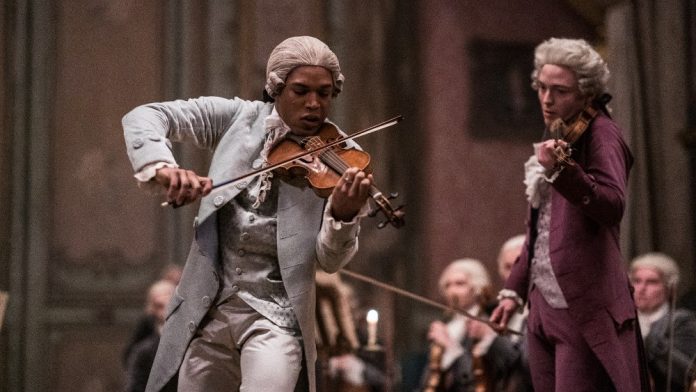For rising young actor Kelvin Harrison Jr., the non-traditional biopic Chevalier proved to be the right project at just the right time. Directed by Stephen Williams, the Searchlight film tells the true story of Joseph Bologne, someone whose musical legacy has endured over centuries despite attempts to deliberately erase him from music history.
Chevalier is the title given to composer and musician Bologne by the French Queen Marie Antoinette (played by Lucy Boynton from Sing Street) to honor his skills as a master violinist, expert fencer, and champion horseback rider. The son of a French plantation owner and an African slave, Bologne achieved fame and notoriety due to the Queen’s endorsement, but his boundless ego coupled with his illicit affair with a married opera singer (played by Samara Weaving from Ready or Not) put him at odds with a country that eventually turns on its beloved Queen.
Harrison first got attention for his early performances in Anthony Mandler‘s Monster, Reinaldo Marcus Green‘s Monsters and Men, and a pair of films from director Trey Edward Shults — It Comes at Night and Waves. He followed those indies with a key role in Joe Wright‘s Cyrano before playing blues legend B.B. King in Baz Luhrmann‘s Elvis.
Chevalier premiered at the 2022 Toronto International Film Festival, marking the feature directorial debut of Emmy winner Wiliams, who made a name for himself directing episodes of Watchmen and Lost, among other hit shows.
Above the Line recently hopped on Zoom with Harrison to talk about what kind of preparation went into taking on the role of Joseph Bologne, and how his own musical background helped him in that respect.
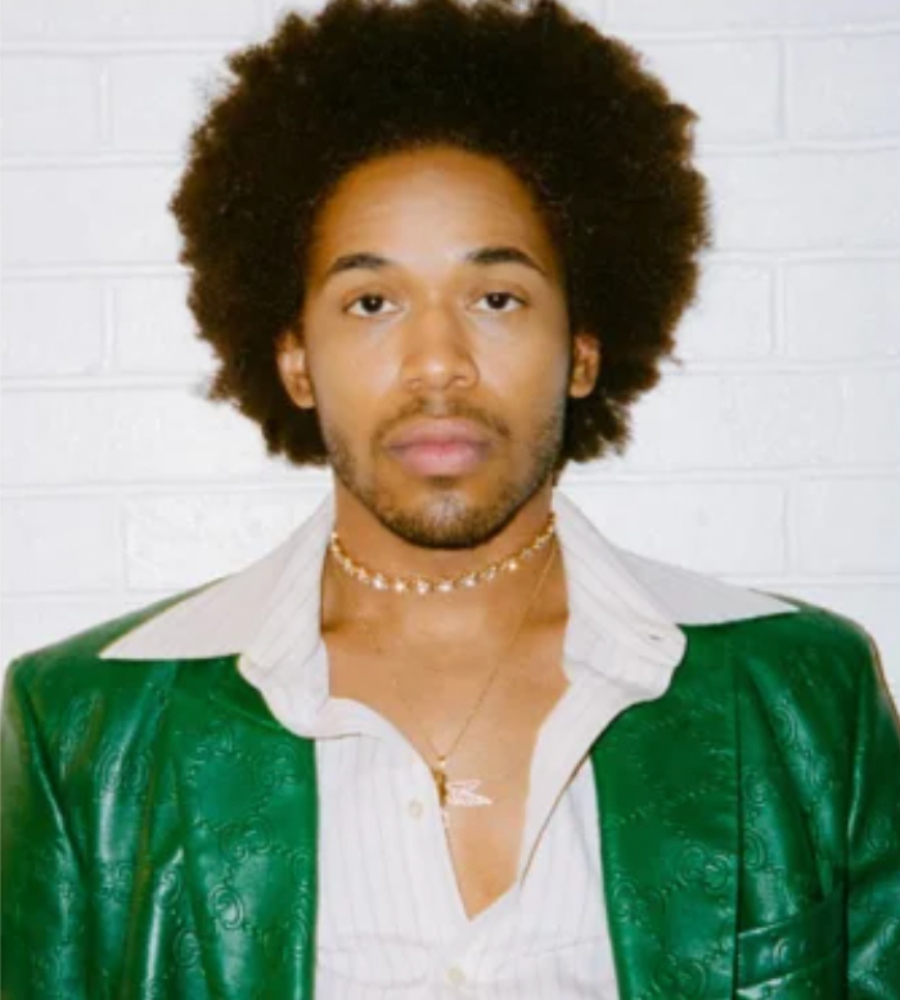
Above the Line: I recently interviewed Stephen Williams, and he mentioned that you come from a musical family, so can you talk about that a bit?
Kelvin Harrison, Jr.: My dad was a classical music teacher and a jazz musician by trade, and my Mom was also a jazz vocalist, so I kind of grew up [around] music. Violin was my first instrument. I played for a couple of years, and then Hurricane Katrina hit, and the program that I was in went away. Then I decided to join my Dad’s class, and I started playing piano and trumpet instead. But yeah, that was our family.
ATL: So you grew up in New Orleans, where there’s a rich legacy of music. How did you first hear about Chevalier, and was it something you pursued, or did the filmmakers come to you first?
Harrison: I first heard about the project through Searchlight. I went on a general [meeting] at the studio, and I was like, ‘Hey, I would love to work with you guys,’ and they were like, ‘We want to work with you. We just have to find the right project.’ One of the things they listed that I could potentially do was Chevalier.
At that time, it was way early in the process. They didn’t have a director or anything like that. Once they got financing, and they got the director, then eventually, I met Stephen, and [we] had a great conversation. He was like, ‘I would like to see you read.’ I was quarantined for Elvis so I auditioned and sent in a tape, and I did a callback, and then I got the gig.
ATL: Did Stephen ask you why you thought you should play this role, and did your background as a violinist help you land the gig? I’m not sure if you had any fencing experience from Cyrano, but did you have to do some training for Chevalier?
Harrison: I definitely had to do a lot of training. Cyrano [is where] I got my introductory fencing training from, and then in Prague, they brought on these expert fencing masters there, and I worked with them for a few months. [With the] violin, obviously, I had to start really early. Luckily, the shoot got pushed a little bit, so I had more time. I had about five months to train just for the music in the movie, to play those tracks, and yeah, it was a lot of homework.
ATL: Was the screenplay in pretty good shape once you got cast and signed on to the project?
Harrison: The screenplay we shot is different from the one that I signed onto. It went through a series of maybe four or five drafts [before becoming] the one we actually see on camera. That’s not uncommon, I guess. It happens a bit. There were some big moments that were shifted a lot, I would say, for sure, from the original screenplay.
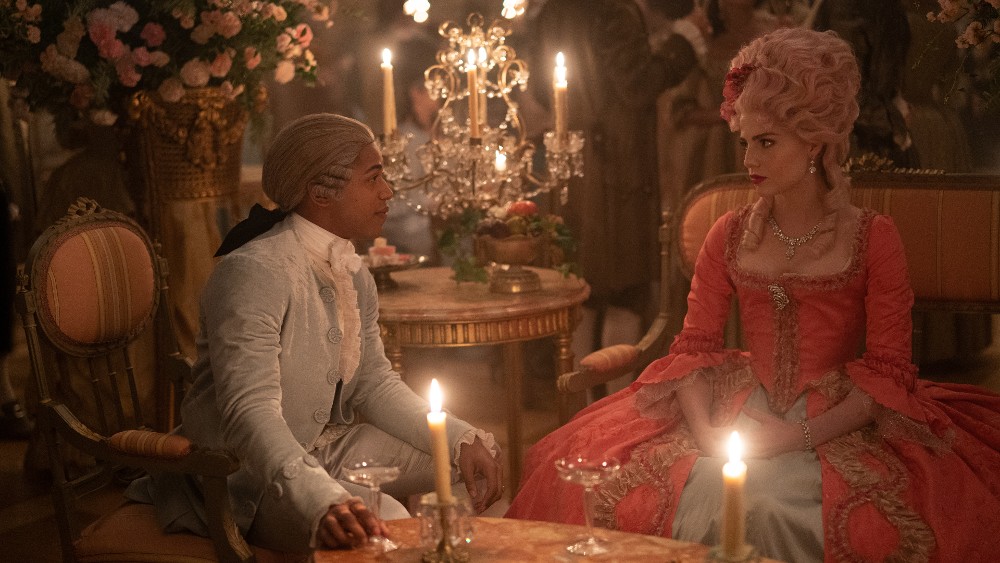
ATL: I think Stephen mentioned you shot in Prague because I guessed that was one of the few places that still looked like 17th Century France, architecturally speaking…
Harrison: It was really beautiful. You get the rural cobblestone in Prague. You get these beautiful cathedrals and stuff like that. We shot in the theater [where] Mozart premiered Don Giovanni. That’s where the Mozart and Chevalier duel is. You can’t beat that when you’re doing a movie like this, so there are certain things that really bring us in, but Karen Murphy, our production designer, really brings it all together, in my opinion.
ATL: Everyone involved did an amazing job. I know that Stephen and writer Stefani Robinson did a ton of research in developing this, so what was your reaction when you first heard about Chevalier and his story? It’s not one that’s particularly well known, so did you feel like you had to do your own research into him or did you rely solely on what was in the script?
Harrison: I had to do a lot of [my own] research. I think the thing is that ultimately, I do have to serve the story that they want to tell. My job as an actor, to me, is to investigate all the potential truths and then bring them to the table to help them realize their vision [and] see it come to life. That takes me, also, diving into French history and the 1700s and looking at the laws and who was in power and the kings and trade and currency — blah, blah, blah, blah, blah, blah, blah — all that boring stuff.
ATL: I can’t imagine staying in character the whole time, because that would be impossible, but how do you throw yourself into a role like this and incorporate everything you’ve learned in order to make the character more authentic?
Harrison: It’s not like I stay in character, but I do hold their energy. Does that make sense? I hold their emotional truths, so I hold their sense of identity, their egos. I hold their insecurities [and] those character things, based on the historical facts. But it’s not like I’m walking around in Prague being like…
ATL: Wearing the wig and the costume…
Harrison: Yeah, exactly. Nah, [laughs] that would be pretty weird.
ATL: You already had some background playing violin, so what else did you have to do to prepare yourself for that opening violin duel with Mozart? That’s such an amazing scene. How much more did you have to learn to pull that off?
Harrison: It was a lot. I think the biggest thing, to be honest, [is] that scene, and most of the dexterity of getting there and understanding where the bow needs to go, and all those things. It’s really quick. They say [Joseph] is a virtuoso, which means he plays really fast. He loves a really fast lick. The cheat code that people don’t realize is that they’re just scales. It sounds fancier than it is, but when you think about it almost as a chromatic scale, all the notes are next to each other. You just have to get there fast enough to be able to play them. I understand my scales and stuff like that, but it was just, like, my hands weren’t moving fast enough in the beginning. I took it half-speed and I learned it slow, and then I would bump up the tempo every week to get to where it needed to be.
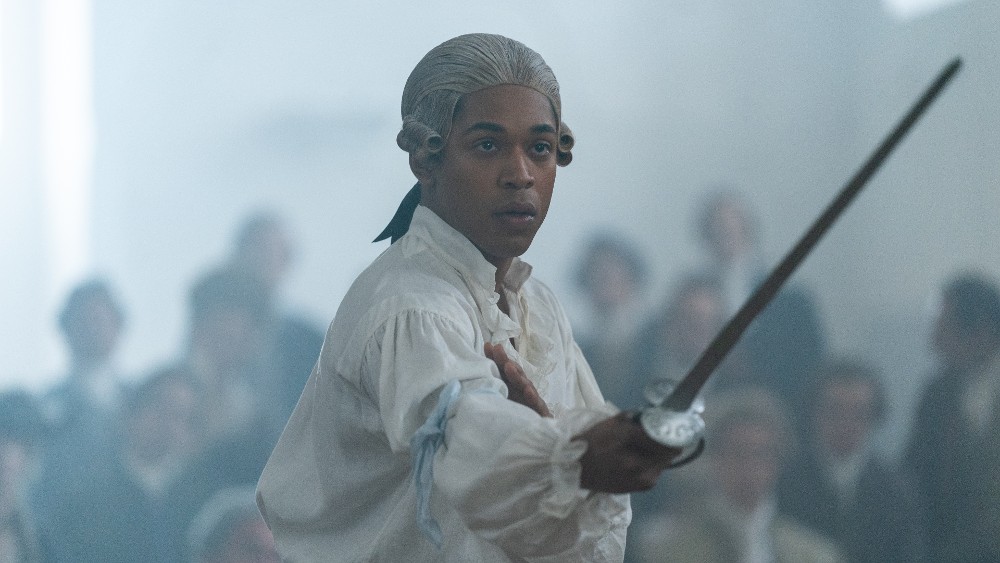
ATL: I think I read that you had a movement coach. Was that more for the violin playing, or for the fencing element of your performance?
Harrison: It was more so because Stephen wanted that duel to feel like he was a rock star of the time. He wanted to lean into it, and not just have two people playing the violin. ‘Let’s play into the camp of it.’ What the movement coach helped us do was, Stefani wrote in her script, originally, ‘it was like Jimi Hendrix and [Eric] Clapton battling each other.’ So we watched physical footage of [Hendrix] shredding the guitar and then Prince was another reference we wanted to stick with, so, “How does Prince walk? What does Prince’s showmanship look like?” And trying to find how we can implement that on the stage in that moment to help tell [our] story. That’s where Polly Bennett, the movement coach, came into play.
ATL: I’ve actually had a chance to see Prince live a few times, so I can definitely see that comparison. It was impressive how that was integrated into this 17th Century environment. I was curious to know how you worked with Michael Abels. I know he was involved with arranging the live performances, and he conducts as well, so did he give you any tips on conducting?
Harrison: I did call him. I asked him if he [could] sit and talk to me for a few hours, and we discussed mostly where he was coming from in some of his compositions and what story he was trying to tell, and what he was feeling when he was writing them. The thing about conducting is, it’s so singular to the conductor. It’s performance. We all just saw Tár, and she has a good way of doing that, too. What I wanted to understand from Michael was understanding his music so that I can convey that in the cues, [and] in expressing it, but I also had an etiquette coach. There was a lot of, ‘Alright, don’t do too much.’ He’s still in the 1700s, [so] you can’t be really big about it, but Michael really helped explain the emotionality of it all.
ATL: Stephen also mentioned that Chevalier was a master horseback rider, too, but I don’t remember seeing you ride horseback in the film.
Harrison: I think we were gonna do horseback riding, and I fractured my clavicle, and then they were like, ‘Insurance? I don’t think so.’
ATL: He also said that you didn’t have a stunt double for anything, so you did all the sword fighting yourself?
Harrison: No, I did it all by myself. I’m a martial artist. I have my black belt in Korean Kuk Sool Won, so movement and stuff like that isn’t that scary to me. I’m Tom Cruise-ing it for the time being until I can’t Tom Cruise it anymore.
ATL: I think I also read that part of being the lead in this movie also meant that you became a leader on the set, so do you take on different behavior when you’re the lead in a movie, and try to take charge and set an example for others?
Harrison: I didn’t even know that people said that about me. That’s cool.
ATL: It’s in the press notes. It must be true.
Harrison: [laughs] Right. For me, it’s just the principle of making sure everyone’s having fun, and they feel safe. My whole thing is, if I’m going to be on a movie every day for a long time, I just want to make sure everyone feels like they can express themselves fully, that their process is valid, and that we’re trying things. I remember Jennifer Ehle — and I haven’t talked about this in many years, but it stuck with me — when I was filming one of my first films, Monster, it was the first time I was #1 on the call sheet, and I was [the] lead of a movie. I was, like, really scared, because in my mind, it was a big responsibility, and I didn’t want to mess it up. Jennifer Ehle was like, ‘You’re great. The biggest thing you need to think about is, just be kind.’ “Just be kind.” I kind of take that with me and just make sure everyone’s being nice. If you’re not being nice, you gotta go.
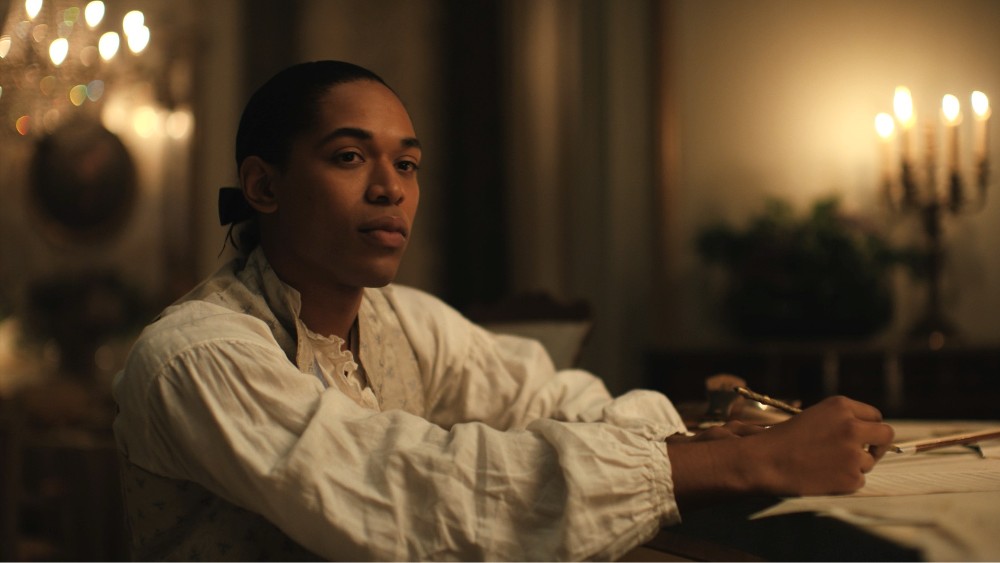
ATL: Fair enough. Obviously, Chevalier has been very much present in your mind, but do you have anything else coming out soon that you’re excited for people to see?
Harrison: No, I don’t have anything else coming up this year. That’s rare. I feel like I usually have at least a couple of things coming out, but this is it.
ATL: Did you enjoy your time playing B.B. King in Elvis, and have you thought about maybe playing him in another movie more focused on his life?
Harrison: I mean, that’d be cool. I heard Wendell Pierce is gonna play a version of him. I think he’ll be really wonderful, and that’s really cool. I’ve had my moment with it, and it was fun. I have one more biopic that I’m going to do. I’m going to do a Jean-Michel Basquiat movie next year. I think that’s gonna be really cool. [Note: That film is called Samo Lives, and it will reteam Harrison with his Luce director Julius Onah.]
ATL: You’ll have big shoes to fill since Jeffrey Wright played him so early in his career. Have you seen that movie, Basquiat?
Harrison: Of course. Jeff is great. [He’s] incredible.
Chevalier opens in theaters nationwide on Friday, April 21. Look for our interview with director Stephen Williams shortly.


